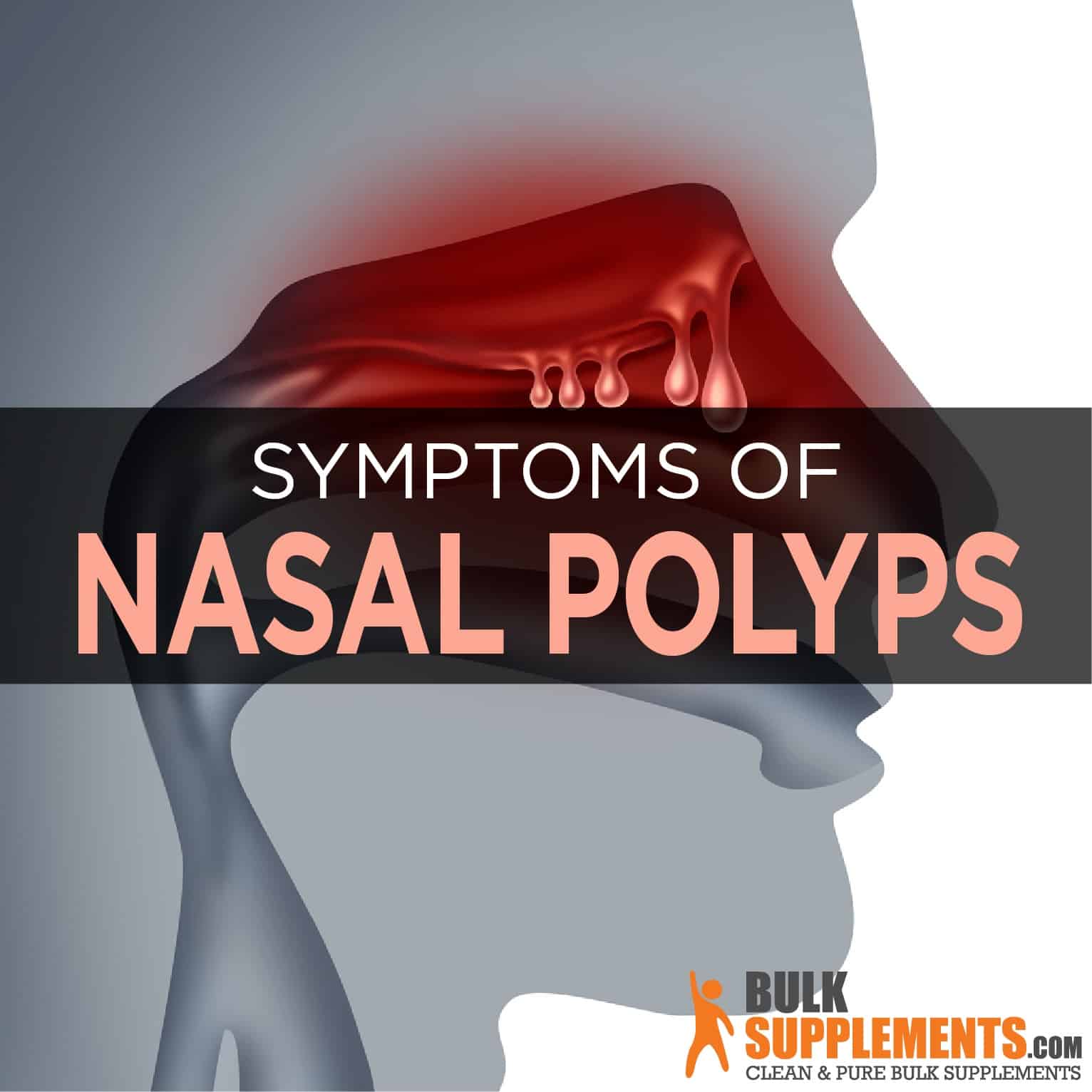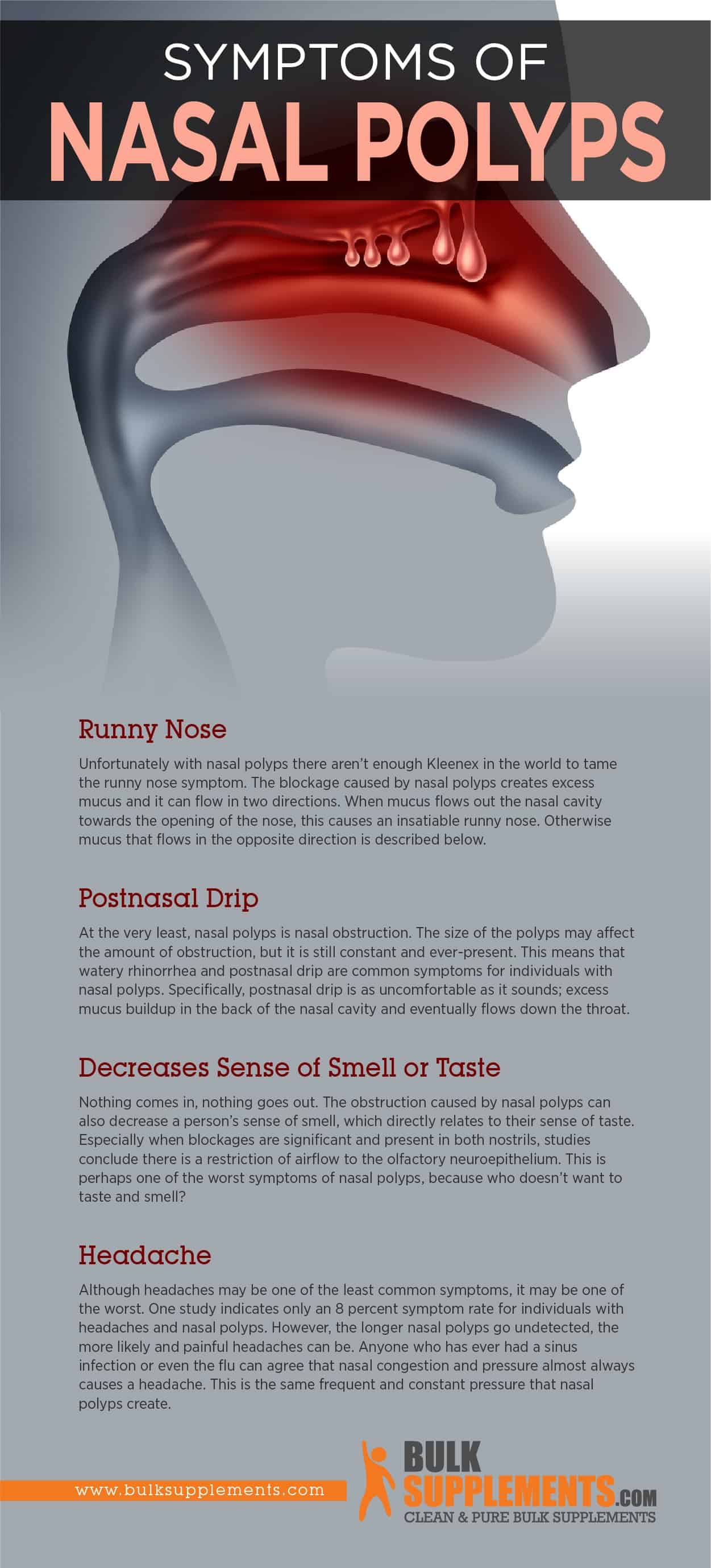Nasal Polyps: Symptoms, Causes & Treatment
by James Denlinger Digital Marketing Strategist
What are Nasal Polyps?
A runny nose is one thing, but the constant grievance caused by nasal polyps is practically unbearable. On the positive side, these growths are non-cancerous, but individuals wish they could live without them. Nasal polyps are fleshy, swelling growths found in the lining of the nose and paranasal sinuses. They can vary in size and color, usually yellowish-brown or pink, and usually develop in multiples, appearing like grapes on a stem. As you can imagine, having these growths in the nose can cause breathing problems and affect an individual’s sense of smell. Other symptoms include stuffy nose, nasal congestion and postnasal drip. Of course, individuals would hope to have symptoms, because on occasion nasal polyps have no symptoms, making them hard to detect.
If you are suffering from nasal polyps, it is helpful to know you are not alone. They affect men more than women, and affect an estimated 4 to 40 percent of the population. They can develop at any age, but are most common for young and middle aged adults. The strangest symptom related to nasal polyps is sleep apnea, as if they aren’t hard enough to live with already. The pain and irritation that comes with nasal polyps can be alleviated with several natural remedies such as cayenne, chamomile and turmeric, to name a few. However it is common to have nasal surgery for permanent relief.
Symptoms of Nasal Polyps
Runny Nose
Unfortunately with nasal polyps there aren’t enough Kleenex in the world to tame the runny nose symptom. The blockage caused by nasal polyps creates excess mucus and it can flow in two directions. When mucus flows out the nasal cavity towards the opening of the nose, this causes an insatiable runny nose. Otherwise mucus that flows in the opposite direction is described below.
Postnasal Drip
At the very least, nasal polyps is nasal obstruction. The size of the polyps may affect the amount of obstruction, but it is still constant and ever-present. This means that watery rhinorrhea and postnasal drip are common symptoms for individuals with nasal polyps. Specifically, postnasal drip is as uncomfortable as it sounds; excess mucus buildup in the back of the nasal cavity and eventually flows down the throat.
Decreases Sense of Smell or Taste
Nothing comes in, nothing goes out. The obstruction caused by nasal polyps can also decrease a person’s sense of smell, which directly relates to their sense of taste. Especially when blockages are significant and present in both nostrils, studies conclude there is a restriction of airflow to the olfactory neuroepithelium. This is perhaps one of the worst symptoms of nasal polyps, because who doesn’t want to taste and smell?
Headache
Although headaches may be one of the least common symptoms, it may be one of the worst. One study indicates only an 8 percent symptom rate for individuals with headaches and nasal polyps. However, the longer nasal polyps go undetected, the more likely and painful headaches can be. Anyone who has ever had a sinus infection or even the flu can agree that nasal congestion and pressure almost always causes a headache. This is the same frequent and constant pressure that nasal polyps create.
Other Symptoms
Nasal polyps can come with a long list of symptoms, much longer than those listed above. Symptoms can often depend on the size of the polyps; small polyps showing less symptoms, and large polyps being more symptomatic. Other symptoms may include:
- Persistent stuffy nose
- Pain in the face
- Snoring
- Itchiness around the eyes
- Sleep apnea
- Double vision

Causes of Nasal Polyps
As if living with these growths could be any more challenging, there is in fact no known cause. They are commonly linked to non-allergic asthma, but several cases have no links to asthma whatsoever. Since there is no known cause of nasal polyps there is less to be studied, but researchers agree that they are a result of swelling and not a disease.
Supplements and Treatment for Nasal Polyps
Cayenne
Most people that battle constant sinus issues know that any kind of pepper is a lifesaver, but cayenne pepper specifically contains capsaicin. Capsaicin specifically can open up nasal passages, relieve inflammation and increase immunity. The recommended dose of cayenne pepper for adults is 30 to 120 mg per day.
Chamomile
Chamomile is known as the calming remedy for more conditions/diseases than one. For centuries, chamomile has commonly been used for sinuses and allergies, specifically to relieve inflammation. Drinking chamomile tea is a delicious and preferred way to remedy nasal polyps. You may drink up to four cups of chamomile tea. The exact dosage of chamomile however is 220 to 1,600 mg per day for adults.
Butterbur
Most people have never heard of the unique butterbur plant. This plant is a part of the Petasites or sunflower family. They are perennial plants, with thick-rhubarb like leaves and have been commonly used for allergy-related problems including allergies, sinuses, headaches, and migraines. Since butterbur is such a unique plant, only take as suggested — 50 to 100 mg taken twice daily by mouth.
Turmeric
Since polyps are caused first and foremost by inflammation, the more ways you can reduce inflammation, the better. Turmeric is an ancient yellow healing and culinary delicasse used for its anti-inflammatory benefits. This includes reducing the inflammation of airways, although turmeric does not permanently cure nasal polyps. The recommended dosage is 500 to 2,000 mg per day.
Garlic
If you’re not a garlic lover already, if you have nasal polyps, you will be. Garlic is yet another natural remedy praised for its antimicrobial benefits, immunity booster and for reducing inflammation. There are endless ways to intake your daily dose of garlic, but if you never thought you could have too much garlic, think again. The recommended amount of raw garlic is 2 to 5 grams per day and 300 to 1,000 of non-fresh or other forms.
Ginger
Ginger is surprisingly similar to garlic. It offers the same antimicrobial, immunity, soothing, and anti-inflammatory benefits, with a different taste. The anti-inflammatory characteristic is especially helpful for nasal polyps. Hot ginger tea is commonly preferred, but can also be used as a spice. The recommended dose of ginger is 170 mg to 1 g, 3 to 4 times daily. Keep in mind ginger can have several harmful interactions with other medications, so always consult your doctor first before taking.
Other Remedies and Supplements
When it comes to nasal polyps, it’s all about clearing up those nasal passages, primarily by reducing inflammation. The natural remedies and supplements will not permanently cure nasal polyps, but can provide soothing relief. Other natural remedies include the tree oil, eucalyptus oil, peppermint, steam/ humid air, echinacea and a jetty pot. Final remedies and permanent relief, especially for large polyps is can typically only be found with nasal surgery.
The Bottom Line
Nasal polyps is no doubt the world’s worst stuffy nose. Stuffy, congested, runny, however you describe it, individuals with nasal polyps experience discomfort and even a lack of taste and smell. Most of us don’t realize how important our nose really is, until we can’t use it properly anymore. If you suffer from this rare condition, since there is no known cause and no way to prevent it, the best you can do is relieve it. At least you don’t have to take endless prescriptions with risky side effects. Nasal polyps can be easily relieved with several natural supplements such as garlic, ginger, chamomile, peppermint, turmeric, butterbur and more. Always consult your doctor before taking any of these supplements, but don’t suffer from nasal polyps any longer.
Sponsor Ads
Created on Mar 1st 2020 21:09. Viewed 454 times.



